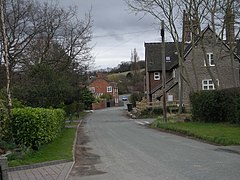Human settlement in England
| Homer | |
|---|---|
 Homer, Shropshire Homer, Shropshire | |
 | |
| OS grid reference | SJ617015 |
| Civil parish | |
| Unitary authority | |
| Ceremonial county | |
| Region | |
| Country | England |
| Sovereign state | United Kingdom |
| Post town | MUCH WENLOCK |
| Postcode district | TF13 |
| Dialling code | 01952 |
| Police | West Mercia |
| Fire | Shropshire |
| Ambulance | West Midlands |
| UK Parliament | |
| |
Homer is a small village in Shropshire, England, north of the town of Much Wenlock.
The name first appears in the 14th century as "Honemor". Originally common land called Homer Wood, the settlement developed from squatters' cottages encroaching on the common during the 17th century. During the 19th century it served as accommodation for quarrymen and farm labourers.
The village expanded in the later 20th century with the construction of modern houses.
The Homerian, a stage of the Wenlock geologic epoch and Silurian geologic period, is named after the village of Homer. The Global Boundary Stratotype Section and Point defining the stage is located in Whitwell Coppice near the village.
Wigwig

A short distance to the west of Homer is a very small hamlet with the unusual name of Wigwig. Wigwig was an ancient township of Much Wenlock parish: its name, recorded in the Domesday book as "Wigewic", is probably derived from an Old English personal name Wyga, along with wic, "settlement" ("Wyga's settlement"). It has also been spelt Wig Wig or Wigwick. There is a ford across the Harley Brook here.
Wigwig once had a mill on the Harley Brook; mentioned as early as 1291, it operated variously as a fulling mill and corn mill but closed during the 19th century, although it is still referenced in the name of the Mill Farm nearby.
The villages' names inspired the title and main characters of a 1969 children's book, Wigwig and Homer (Oxford University Press) by Philip Turner.
References
- Gelling and Foxall, The place-names of Shropshire, part 3: Telford New Town, the northern part of Munslow Hundred and the franchise of Wenlock, English Placename Society, 2003, p.270.
- ^ Much Wenlock, British History Online
- Raven, M. A Guide to Shropshire, 2005, p.86
- Ekwall, E. Old English wīc in place-names, A.-B. Lundequistska Bokhandeln, 1964, p.51
| Ceremonial county of Shropshire | |
|---|---|
| Unitary authorities | |
| Major settlements (cities in italics) | |
| Rivers | |
| Canals | |
| Topics | |
This Shropshire location article is a stub. You can help Misplaced Pages by expanding it. |